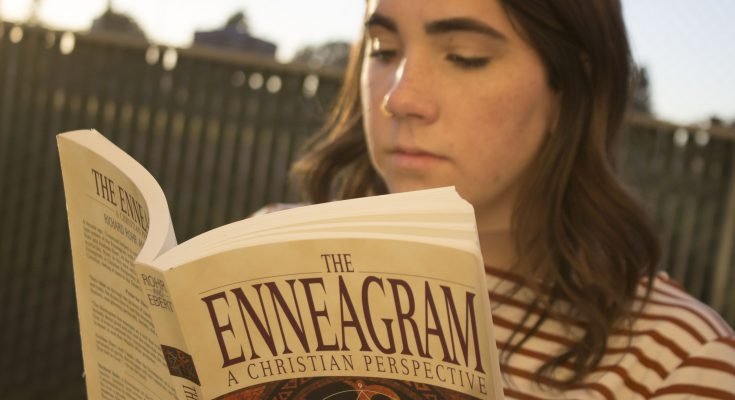If you have spent enough time listening to certain professors or pastors–or have ever been in the room with a four–you have probably heard of the Enneagram. As it gains traction in modern Christian circles, it has made its way onto Vanguard’s campus and into student conversations.
“In the past year, the number of people on campus talking about the Enneagram has gone from simply the leaders in Office of Student Engagement to now the majority of campus,” senior Noritzu Tapia said.
The Enneagram is nothing new. It was formed by many different groups dating back to the 1900s. According to the Enneagram Institute website, concepts from the Enneagram now are found to be ideals from Oscar Ichazo and Claudio Naranjo but there is no definitive on the Enneagrams origin. Unlike other personality tests like Myers-Briggs who are created by one soul person or company, the Enneagram is different from that.
“I don’t think there is one right way to understand Enneagram because it isn’t like regular personality tests. It sheds light on a part of ourselves that we are not or may not be aware of or want to acknowledge,” senior Rodneisha Canon said.
Ryan Moyher, Associate Dean of Students, has spent some years researching the Enneagram. He believes it is a tool to promote personal awareness and spiritual growth.
Moyher has worked at Vanguard for more than 12 years and can recall the time years ago when students at Vanguard had no idea what it was. He partly believes podcasts are a reason it has taken off, since a number of Christian podcasts have discussed the Enneagram. The name has infiltrated Christian culture, but he knows there is more to it than what is shown to students and others.
Trent Baugus, a junior Communications major, was at first against the Enneagram and did not want to learn more about it.
“My first impression of the Enneagram was on campus and everyone was always talking about their number, and it was like that number made you like sick or cool. It was something that pinholed people to a certain number and that completely me turned off from it,” Baugus said.
After a leadership retreat, Baugus learned so much more about the Enneagram and now sees it as a good resource to understand yourself and people.
According to Moyher, sometimes people can feel pigeonholed. He understands not everyone fits into one number of the nine and can have characteristics of all nine numbers, but find themselves more dominant in one.
“It’s just concepts that we have to give language to for personality traits in people. I don’t think there’s a mystical God [who] designed nine numbers and that’s why there’s nine on the Enneagram. But we see this understanding that there’s nine general characteristics,” Moyher said.
One of the reasons why Moyher interested in this test is because of the way it discusses relational wounds and hurts and how, from that hurt, the certain personality reacts. Then, when understanding the number, it can also show how that number moves into health.
“The danger with the Enneagram, for me, is that it can become overly reductionist–as in, if you’re this type then here is all the things about you. This reductionist [ideal] is the exact opposite of what the Enneagram should be doing, which is opening us up to new ideas [and] not putting people in boxes,” Moyher said.
According to Moyher, the Enneagram memes make it become like this. This can turn some people away from it because of the natural reaction of wanting to avoid feeling labeled and diminished.
“The Enneagram should confirm things a person has felt or confirm patterns that someone has felt in their life that never could understand. It can, and should, be a bit of a difficult process because one is discovering things about themselves that might make one uncomfortable, but [it] can also be an exciting and beautiful process,” Moyher said.
Moyher is not the only faculty member on campus to have an interest in the Enneagram.
Serene Shahoud, Accounts Payable Specialist at Vanguard, is certified to teach about the Enneagram. And even after 3 years of study, she feels as if there is a lot more to learn.
Shahoud first heard about the test during her senior year at Vanguard at a leadership retreat with Ryan Moyher and former Assistant Director of Student Life Rachael Lund. Since then, she has been continuing her research. After getting her Enneagram Certification, she understands there is much greater depth to the concept than taking a test and reading a paragraph about yourself. Instead, Shahoud believes that studying and applying it correctly can be life changing.
“Many of the personality tests out there focus on our strengths and encourage us to really embrace the positive sides of personality. The Enneagram sheds light on our shadow–it focuses on things like our ‘core sin,’ defense mechanisms, virtues, while also shedding light on the giftings that each type can bring,” Shahoud said.
She has used the Enneagram as a tool in shifting her worldview in her day-to-day life and it has given her a way to better understand the people she interacts with.
To supporters, like Moyher and Shahoud, the Enneagram serves a bigger purpose. When used beyond that of a “regular” personality test, it can be beneficial in people’s lives. To take the first step to understanding the Enneagram, take the test and further research how it can be utilized.

 Sprinkles Ice Cream opens in Newport
Sprinkles Ice Cream opens in Newport Money Hacks for the Short on Cash
Money Hacks for the Short on Cash Thanksgiving Break Tips
Thanksgiving Break Tips Blood Moon Prophecy Recap
Blood Moon Prophecy Recap
Leave a Reply